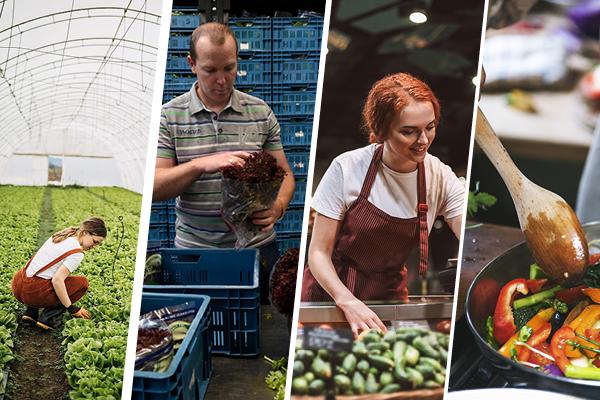
Build trust, foster a collaborative approach and keep monitoring food supply: these principles are among the latest set of recommendations published today by the expert group on the European Food Security Crisis preparedness and response Mechanism (EFSCM) to mitigate risks and vulnerabilities putting at risk food supply chains. Today’s publication sets a general framework of measures and preventive actions to be taken, common to all members and observers. Because food security is a cornerstone of food sovereignty, open strategic autonomy and economic resilience, these recommendations directly contribute to the upcoming report on Europe’s civilian and defence preparedness and readiness prepared by former Finnish President Sauli Niinistö.
The EU food supply chain has proven its resilience and efficiency in the first weeks of COVID in 2020 and in the trade disruptions that followed Russia’s aggression of Ukraine in the beginning of 2022. EU citizens can at all times have access to a sufficient and varied supply of safe, nutritious, affordable and sustainable food. However, this situation and the work of all actors along the chain cannot be taken for granted. Several risks and vulnerabilities could threaten the stability we are benefitting from now.
A report published by the Joint Research Centre (JRC) in November 2023 identified 28 risk categories (biophysical and environmental, economic and market, socio-cultural and demographic, geopolitical and institutional, supply chain performance, information and technology) and nine main factors of vulnerabilities. An EFSCM sub-group worked from the end of 2023 until now to develop draft recommendations for mitigating risks on the basis of the conclusions presented by the JRC.
The objective was to agree on a general set of recommendations that could fit all actors in the chain, laying the groundwork for possible future, detailed and individual risk-specific analyses. It is expected that all national authorities and stakeholders use the advice given for their own strategic planning, crisis preparedness and management.
The report presents two general principles to mitigate risks, ten structural measures to reinforce the long-term resilience of the food chain and six pieces of advice to strengthen preparedness against crises.
There is a high interconnexion between the food sector and all other sectors of the economy to ensure European food security. Being able to collaborate and adapt are key to addressing risks comprehensively. Making full use of existing platforms for sharing critical information related to risks and emerging threats such as, for example, the group of experts on the EFSCM, the dashboard on food supply and food security, and the Agricultural Market Information System (AMIS) enable a collective response to challenges.
The report acknowledges that the EU legal framework, including the Common Fisheries Policy and the Common Agricultural Policy toolbox, continues to be key to increase the stability and continuity of food availability. The group also stresses the need for robust industrial policy measures, such as the EU Industrial Strategy, to bolster the manufacturing capacity of critical inputs and technologies within Europe and partner countries. Any unjustified restrictions and barriers should be prevented to ensure a well-functioning single market.
All relevant parties should continuously identify risks and keep developing strategies for effective crisis preparedness, mitigation and management. The group of experts on the European Food Security Crisis preparedness and response Mechanism (EFSCM) will continue meeting on a regular basis and whenever necessary in case of emergency.
Background
In response to increasing uncertainty and challenges threatening EU food systems, the European Commission adopted in November 2021 a contingency plan for ensuring food supply and food security in times of crisis. It outlined areas for improvement identified during the Covid-19 pandemic, principles that should be adhered to in times of crisis, and the creation of a European Food Security Crisis preparedness and response Mechanism (EFSCM).
The group of experts under the EFSCM is composed of national authorities of the 27 Member States of the European Union, active in the areas of agriculture, fisheries, aquaculture, health policy or food safety. It includes 14 additional national authorities from non-EU countries (EFTA, Western Balkans, micro-states) whose food supply chains are highly integrated into that of the EU. 30 stakeholders’ organisations participate as members and 16 participate as observers. These representatives provide the perspective of all stages of the food supply chain, including that of input providers, packaging and transport operators.
The Commission convenes the group of experts twice a year to improve levels of preparedness. Meetings are also convened in case of exceptional, unpredictable and large-scale events or risks that have the potential to threaten EU food supply or security. This was the case for example in March and May 2022 to assess the impact of Russia’s aggression of Ukraine on food security and food supply in the EU; in September 2022 to address the surge in energy prices and inflation; and in February 2024 to discuss the potential impact on the supply chain of attacks by Houthi rebels in the Red Sea.
Since its creation, the EFSCM launched the dashboard on food supply and food security, published two reports on the State of Food Security in the EU, carried out Study on risks and vulnerabilities in the EU food supply chain, and published two previous sets of recommendations on ways to reinforce the diversity of sources of supply (PDF), and on crisis communication (PDF).
More information about the group’s activities is available online.
Details
- Publication date
- 23 July 2024
- Author
- Directorate-General for Agriculture and Rural Development
- Location
- Brussels




